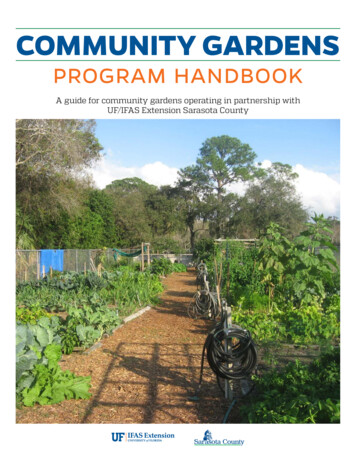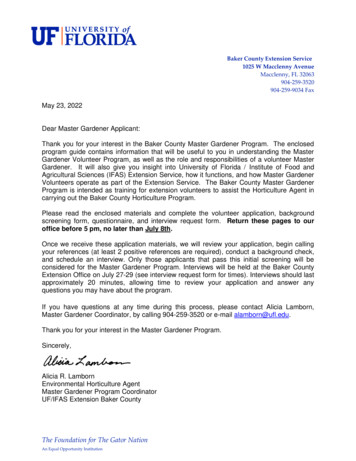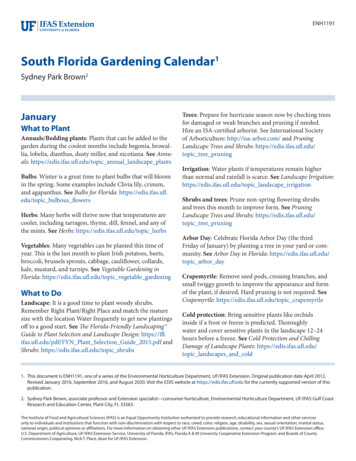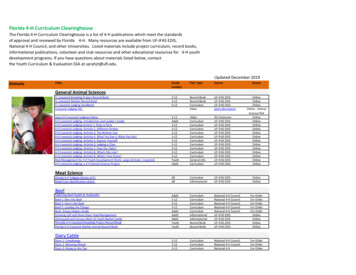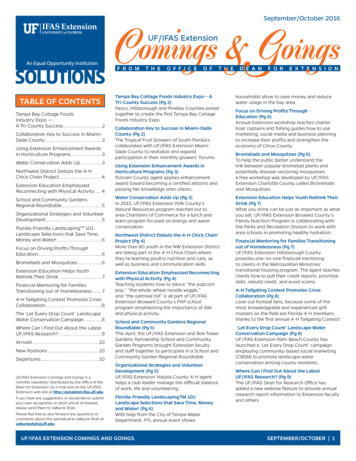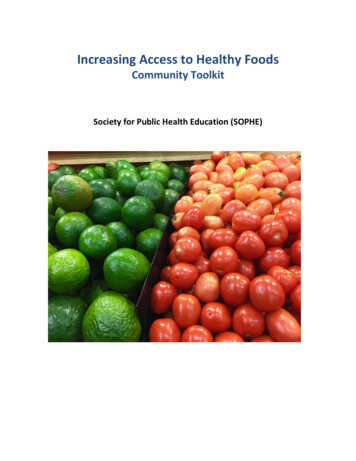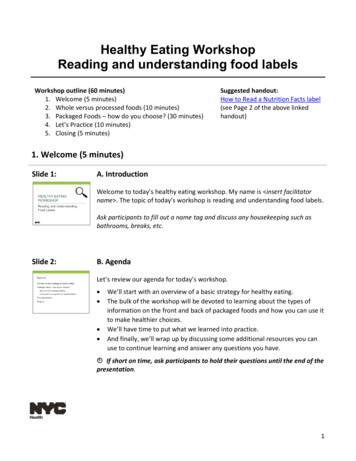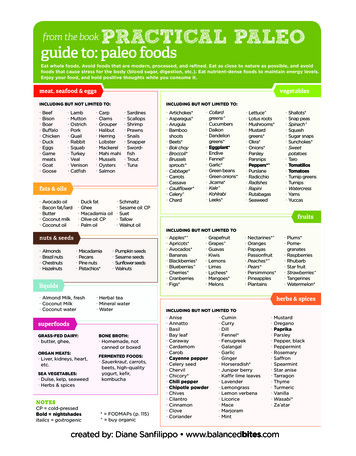
Transcription
1
Cottage Foods 101A Local Foods Enterprise CoursePart #1Robert A. Kluson, Ph.D., AG/NR Extension Agent IIIMaria Rometo, Ed.D., FCS Extension Agent II2UF/IFAS Extension Sarasota County
Course’s OutlinePart # 1 Introduction & history of Cottage FoodLaws in FL & U.S. Requirements of FL Cottage Foods Law Local foods availability for cottage foodsenterprises Food safety for cottage foods productionusing canning and dehydration methods3
Course’s OutlinePart # 2 Labeling requirements Overview of food safety issues Food safety in the home kitchen Marketing plans and requirements Beyond Cottage Foods
Course Objectives Small business incubation of CottageFoods enterprises for the greaterSarasota region Implementation of proper food safetyprotocols by Cottage Foods entrepeneurs Develop business & entrepreneurial skills Encouragement to be part of emerginglocal foods movement of greaterSarasota region5
Cottage Foods Images6
Cottage Foods EntrepeneursImages7
FL Cottage Food Law House Bill 7209 passed during the 2011Legislative session Allows individuals to make, sell and storecertain types of “Cottage Food” products inan unlicensed home kitchen See the video be-sold-without-licensing
Cottage Food Law Images9
Cottage Food Laws Nationwide Recent increase of cottagefood laws nationwideparallels growth of localfoods movement andfarmers marketsnationwide Resulted from grassrootsbased push to allowproduction & sales of nonpotentially hazardous foodsby individuals, outsideexpensive permitting /files/210013/08/FINAL Cottage-Food-Laws-Report 2013.pdflicensing procedures
Cottage Food Laws olicyinitiative/files/2013/08/FINAL Cottage-Food-Laws-Report 2013.pdf11
Cottage Food Laws Nationwide The type of foods approved by any state cottage foodlaw may vary from those in other itiative/files/2013/08/FINAL Cottage-Food-Laws-Report 2013.pdf
Cottage Food Laws Nationwide The type of sales approved by any state cottage foodlaw may vary from those in other itiative/files/2013/08/FINAL Cottage-Food-Laws-Report 2013.pdf
Cottage Food Laws Nationwide The type of permits required by any state cottage foodlaw may vary from those in other itiative/files/2013/08/FINAL Cottage-Food-Laws-Report 2013.pdf
Cottage FoodLawsNationwide The limits of salesapproved by anystate cottage foodlaw may vary fromthose in icyinitiative/files/2013/08/FINAL Cottage-Food-Laws-Report 2013.pdf
Cottage Food Laws Nationwide The limits of sales approved by any state cottagefood law may vary from those in other itiative/files/2013/08/FINAL Cottage-Food-Laws-Report 2013.pdf
CottageFood LawsNationwide The labelingrequired byany statecottage foodlaw may varyfrom those inother itiative/files/2013/08/FINAL Cottage-Food-Laws-Report 2013.pdf
FL Cottage Foods Law Overview Allows individuals to make, sell and store certaintypes of “Cottage Food” products in anunlicensed home kitchen using non-commercialequipment Defined as ‘non-hazardous’ foods only - breads,cookies, baked goods, candies, jellies, jams,honey, granola, fruit pies, etc. Proper labeling is required18
FL Cottage Foods Law Overview Products may be sold at farmer’s markets,roadside stands, or directly to the consumer fromthe producers home Cannot exceed 15,000 in gross annual sales Exempt from state permits but FloridaDepartment of Agriculture & Consumer Services(FDACS) may investigate any complaint19
FL CottageFoods LawBackground Implementation ofrecommendationsfrom a FDACSreport in responseto demands by FLsmall ownload/23846/485964/SmallFarms2011B.pdf
FDACS Small Farms ReportBackground 2010 legislation directed FL Dept of Agriculture &Consumer Services (FDACS) to assess federal, state & local regulations that affect smallfarms sales of agricultural products form the FL Food Safety & Food Defense AdvisoryCouncil to assess the food safety requirements of foodpermits that affect small farms facilities as foodestablishments Develop recommendations based on a report from theAdvisory Council by December 31, 201021
FDACS Small Farms ReportBackground 2010 status of small farms which process,distribute or sell food products under FLFood Safety Act (Chapter 500 FL Statutes) Must have a general food permit to operate Permit fees based upon both risk & size ofprocessing, e.g., supermarkets, conveniencestores, etc Under current regulations, small farms asfood establishments subject to samerequirements of other establishments22
FDACS Small Farms ReportBackground Advisory Council identified 4 foods ofhighest interest for recommendations ofregulatory relief for small farmers fresh eggs poultry honey low risk jams, jellies, and preserves FL Cottage Food Law resulted from theserecomendations23
FL CottageFoods LawDetails24
Definitions Cottage food operation: person whoproduces or packages cottage food productsat their residence Cottage food product: Food that is not apotentially hazardous food and sold by acottage food operation.25
Definitions Potentially hazardous food (TCS):Requires time and/or temperaturecontrol to limit microorganism growth ortoxin formation Residence: Primary residence of anindividual who operates a cottage foodoperation. Single kitchen withappliances designed for commonresidential use.26
Cottage Foods Requirements Exempt from FDACS permit 15,000 gross sales limit Written documentation of sales Direct sales only Must meet local requirements27
Cottage Foods Requirements Direct sales only: Cottage Food Operation Roadside stands Farmer’s markets No internet, mail order, wholesale, orrestaurant sales28
Cottage Foods Requirements Must meet all other local, federal, staterequirements regulating cottage foodoperations Complaint-based inspections only Enforcement for non-compliance29
FL Cottage Foods Law DetailsApproved FoodsNot Approved Foods30
Cottage Foods RequirementsLabeling Requirements Name/Address of cottage operatorName of cottage food productWeight / VolumeIngredients list, descending orderAllergen information*Compliance statement**31
Cottage Foods Requirements Allergen information* milk, egg, fish, shellfish, tree nuts, wheat,peanuts, soybeans Compliance statement** Made in a cottage food operation that is notsubject to Florida’s food safety regulations. MUST be in 10 point font and clear contrastto the label background.32
When Do I Have To Collect Sales Tax? Most food products are exempt from salestax. FL Department of Revenue – Tax InformationPublication: http://tinyurl.com/FLtaxes Exceptions1) Food sold for immediate consumption2) Candy or confections33
Examples of Tax Exempt Food Products Cereal and cereal products, baked goods,vegetables and vegetable products, fruit andfruit products, spices, honey, jams, jellies andpreserves, salad dressing and dressing mixes,syrups, cake mixes *Other items: pretzels, nuts, popcorn andcrackers*For consumption off seller’s premises34
Examples of Taxable Food Products Ice cream and frozen desserts, soft drinks, candyapples, candy/sugar/honey coated pretzels, grainsor nuts, etc.Some food products are taxablewhen sold under variousconditionsFor Example:1) Sold as complete meals on or off premises (Catering)2) Sold for immediate consumption3) Bakery products sold in a facility that has eating facilities35
Do I Need A Business Tax? Yes AKA business license or occupational license Step 1: Register with the State of Florida as a Corporation or as asole proprietor (DBA) - 35 fee Do that online at the Florida Department ofState: (www.sunbiz.org) or call: Doing Business As: 850-245-6058 Corporations: 850-245-6052 Will need a Certificate of Registration (DBA) orCertificate of Status (Corporations)http://www.sunbiz.org/filefee.html36
Check: Local Zoning Ordinances Home-based businesses are termed 'homeoccupations' in the Zoning Code. Home occupations meeting certain criteria arepermitted in any residential district. Home occupations do not allow outsideemployees, exterior signage, stockpiling ofmaterials. Business operating hours.37
Do I Need A Business Tax License? Step 2: Zoning SectionContact - Planning and Development Departmentin your city, or county. Let them know you are operating as a homeoccupation – will need to sign a disclosure form Should receive a certificate of use from them38
Do I Need A Business Tax License? Step 3: Take the copy of your Certificate ofRegistration (DBA) or Certificate of Status(Corporations) from the State Take a copy of your Certificate of Use fromPlanning and Zoning Go to your local Tax Collector’s Office- MUSTAPPLY IN PERSON for Business Tax Receipt.39
Online Business Tax Receipt Resources Sarasota County http://www.sarasotataxcollector.com/OL PAGES/OL GeneralInfo.htm City of Venice http://www.venicegov.com/Files/Forms/Plan Zoning/HomeOcc Brochure.pdf City of Sarasota http://www.sarasotagov.com/NDS/Building/LBTR/Home occ license app.pdf City of Northport t.aspx?documentid 603240
LocalFoodsSources forIngredients41
Local Foods Sources for Ingredients Online guides to local farms– Sarasota Co Extension Websitehttp://sarasota.extension.ufl.edu/ See the “Local & Organic Foods Guide of Farms & Markets inGreater Sarasota Area” Guide includes numerous web-based search engines for localand organic farms in greater Sarasota area, such //eatlocalguide.com/sarasota/Local Farm Guide http://onlinedigeditions.com/publication/?i 177929&p 37http://www.localharvest.org/42
Sarasota Local Foods Sources ExamplesJessica’s Organic FarmFarmers Markets:Phillippi FarmhouseDowntown SarasotaVeniceEnglewoodSiesta KeyNorth PortNewtownProduce StandsOn-Farm Sales43
FL Cottage Food LawHoney Production/Sales Example Exemptions:– food permit requirements by the FloridaDepartment of Agriculture and ConsumerServices– must bottle honey in a certified foodestablishment– must include a nutritional food label on theirhoney should refer to the United States Code(USC) of Federal Regulations, Title 21, Part 10144http://edis.ifas.ufl.edu/in918
FL Cottage Food LawHoney Production/Sales Example In addition:– 2012 Bee Preemption/Apiculture Bill allowsbackyard honey beekeeping and honeyproduction now– Still requires annual bee hive inspection 2012/586.10
2012 Bee Preemption/Apiculture BillHoney Beekeeping Zoning Regulations* Rules* 15’ from property lineSix foot flyoverFenced in yard¼ acre or less three hivesSpecial permit for parksFollow best management practices46
BEST MANAGEMENT PRACTICES FOR MAINTAININGEUROPEAN HONEY BEE COLONIES1. This is a voluntary program designed to minimize the threat of Africanized Honey Bees (AHB) in Florida andto dilute any feral AHB populations that may become established in Florida as our gentle managed colonies areour best line of defense against AHB.2.3.Beekeepers participating in this program must sign a compliance agreement with the Florida Department ofAgriculture and Consumer Services.Beekeepers will maintain a valid registration with the Florida Department of Agriculture andConsumer Services/Division of Plant Industry (FDACS/DPI), and be current with any and allspecial inspection fees.4. A Florida apiary may be deemed as EHB (European Honey Bee) with a minimum 10% random surveyof colonies using the FABIS (Fast African Bee Identification System) and/or the computer-assistedmorphometric procedure, ie. universal system for the detection of Africanized Honey Bees (AHB)(USDA-ID), or other approved methods by FDACS on a yearly basis or as requested.5. Honey bee colony divisions or splits should be queened with production queens or queen cells from EHBbreeder queens following Florida’s Best Management Practices.6.Florida beekeepers are discouraged from collecting swarms that cannot be immediately re-queenedfrom EHB queen producers.7.Florida Beekeepers should practice good swarm prevention techniques to prevent an abundance ofvirgin queens and their ready mating with available AHB drones that carry the defensive trait.47
BEST MANAGEMENT PRACTICES FOR MAINTAININGEUROPEAN HONEY BEE COLONIES8.Maintain all EHB colonies in a strong, healthy, populous condition to discourage usurpation (takeover) swarms of AHB.9. Do not allow any weak or empty colonies to exist in an Apiary, as they may be attractive to AHBswarms.10. Recommend re-queening with European stock every six months unless using marked or clipped queensand having in possession a bill of sale from a EHB Queen Producer.11. Immediately re-queen with a European Queen if previously installed clipped or marked queen is foundmissing.12. Maintain one European drone source colony (250 square inches of drone comb) for every 10 colonies inorder to reduce supercedure queens mating with AHB drones.13. To protect public safety and reduce beekeeping liability do not site apiaries in proximity of tethered orconfined animals, students, the elderly, general public, drivers on public roadways, or visitors wherethis may have a higher likelihood of occurring.14. Treat all honey bees with respect.48
FL Cottage Food LawHoney Production/Sales .htm
References Cottage Food Laws.com - http://cottagefoodlaws.com/ Condra, A. 2013. Cottage Food Laws in the U.S. Harvard LawSchool Food Law Policy Clinic files/2013/08/FINALCottage-Food-Laws-Report 2013.pdf FL Department of State: Starting a Business http://www.sunbiz.org/startbus.html FL Statutes: Cottage Food Operations http://www.flsenate.gov/Laws/Statutes/2012/500.80 Simone, A. 2013. 2011 Cottage Food Legislation. UF/IFASDepartment of Family, Youth and Consumer Sciences.50
morphometric procedure, ie. universal system for the detection of Africanized Honey Bees (AHB) (USDA-ID), or other approved methods by FDACS on a yearly basis or as requested. 5. Honey bee colony divisions or splits should be queened with production queens or queen cells from EHB breeder queens following Florida's Best Management Practices. 6.

